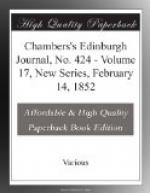‘You seem unhappy to-day, Miss Reay,’ I said abruptly, with my voice trembling like a girl’s.
She raised her large eyes languidly. ’Unhappy? no, I am never unhappy,’ she said quietly.
Her voice never sounded so silvery sweet, so pure and harmonious. It fell like music on the air.
’I have, then, been too much blinded by excess of beauty to have been able to see correctly,’ I answered. ’To me you have appeared always calm, but never sad; but to-day there is a palpable weight of sorrow on you, which a child might read. It is in your voice, and on your eyelids, and round your lips; it is on you like the moss on the young rose—beautifying while veiling the dazzling glory within.’
‘Ah! you speak far too poetically for me,’ said Julia, smiling. ’If you will come down to my level for a little while, and will talk to me rationally, I will tell you my history. I will tell it you as a lesson for yourself, which I think will do you good.’
The cold chill that went to my soul! Her history! It was no diary of facts that I wanted to hear, but only a register of feelings—a register of feelings in which I should find myself the only point whereto the index was set. History! what events deserving that name could have troubled the smooth waters of her life?
I was silent, for I was disturbed; but Julia did not notice either my embarrassment or my silence, and began, in her low, soft voice, to open one of the saddest chapters of life which I had ever heard.
‘You do not know that I am going into a convent?’ she said; then, without waiting for an answer, she continued: ’This is the last month of my worldly life. In four weeks, I shall have put on the white robe of the novitiate, and in due course I trust to be dead for ever to this earthly life.’
A heavy, thick, choking sensation in my throat, and a burning pain within my eyeballs, warned me to keep silence. My voice would have betrayed me.




